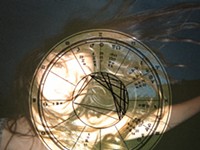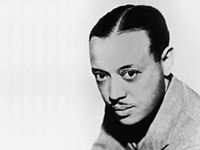[
{
"name": "500x250 Ad",
"insertPoint": "5",
"component": "15667920",
"parentWrapperClass": "",
"requiredCountToDisplay": "1"
}
]
Much has been written about how Apple's iPod and similar devices have revolutionized the pop music business. People who own the portable MP3 players download individual songs for 99 cents apiece, and record companies are trying to wrap their earbuds around all the implications the technology has for profit-making ventures.
Less has been written about how iPods and other personal music devices are affecting the feeble classical music recording industry. But so far, the news is mostly good.
Classical music downloads account for a whopping 12 percent of Apple's online music purchases. That's amazing, since back in pre-iPod days, classical CDs accounted for only 3 percent of all music sales.
The reasons for the surge in popularity are unclear, since the traditional classical recording industry remains incredibly sluggish. Earlier this month, Warner Classics shut down its operation, leaving 40 highly skilled artists out in the cold and just three major labels producing a few dozen new classical CDs a year.
But orchestras and artists remain undeterred. They hope they can reach listeners directly, and they're targeting those who are willing to pay online.
The Los Angeles, San Francisco, and Milwaukee symphony orchestras have started offering downloadable concerts for $9.99 each. Artists such as singer Andrea Bocelli and cellist Yo-Yo Ma are consistently listed in the Top 10 downloaded classical musicians. The New York Times reports that in 2005, classical album downloads were up by 94 percent.
The Rochester Philharmonic Orchestra, one of the few American symphonies that still records CDs, is aware of the possibilities. In a few weeks, RPO musicians will offer podcasts from Vail, Colorado; audio diaries of their upcoming trip out West. But those are just voices talking, not music.
"We're not there yet," says RPO assistant director of marketing Janice Hanson, who says that since the musicians' current contracts would not permit online distribution, the RPO isn't yet making plans to offer downloadable concerts.
For users, the iPod blurs the lines between classical and everything else. Its shuffle feature, which allows listeners to mix up the order of what they're listening to, disregards genre. So, for example, if you like Mozart and Etta James and the Dixie Chicks and you hit "shuffle," you might hear the Overture toThe Magic Flute followed by "Stop the Wedding" followed by "Not Ready to Make Nice," not necessarily in that order.
A random survey of Rochester musicians and classical music listeners shows people sense boundaries are dissipating.
"My range of listening has opened up considerably," writes Suzuki violin teacher Lynn Rubier-Capron, who got her iPod two months ago. So far, she's loaded some classical music, Scottish fiddle tunes, and a few books on tape, which she listens to in the car. "I am much quicker to mix genres in one sitting," she says. "I try new things out and disregard them if I don't like them."
Other users find they're now ignoring traditional outlets. "I tend to not listen to radio or CDs as much," says Wade Richards, head of the music therapy department at the Hochstein School of Music and Dance.
Classical fan Laura Garrison had the same experience. When she received an iPod about a year ago, she loaded it up with everything she likes and a few things for people around her: ska for her husband, rap for her son, and big band for her father. Then she realized she wasn't hearing anything new.
"I try to take the free iTunes download every week so I can get something I wouldn't necessarily know about," she writes via e-mail. "I also listen to the radio a little each day (WXXI-FM, where Garrison works) to keep expanding the scope of classical music I like."
Others are less charmed with the device. Violin teacher Margaret Coote, who just bought an iPod from her brother-in-law, finds it frustrating.
"It's clear that the iPod was not designed with classical music in mind," she complains. For one thing, there's not enough space on the screen for all the information on what she's listening to --- the composer, name of piece, and performers. Coote also finds fault with the way the iPod chops up longer works into short sections.
"I actually think this is also breaking down the idea of a concept album in rock and pop, which is too bad. Our idea of music is becoming an endless succession of singles," she says.
Singer Allyn Van Dusen, who shares an iPod with her family,says she misses physical CDs with booklets and artwork and texts. She says, "I do regret the likelihood that physical media like CDs will decline and perhaps disappear altogether."
That may happen. Bandwidth may trump plastic. But the music it delivers will work the same as it ever did, enchanting listeners with its melodies, rhythms, and allure.
Brenda Tremblay hosts weekly concerts by the Rochester Philharmonic Orchestra Tuesdays at 8 p.m. on Classical 91.5, WXXI-FM.







